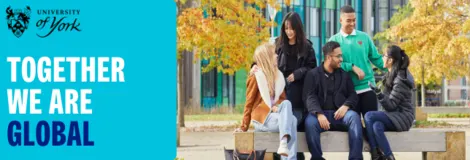The University of Stirling, founded in 1967, is in Scotland. Covering 360 acres within the Airthrey Castle estate, the campus has modern facilities with historical charm. Stirling is recognised for its academic prowess and research excellence and offers diverse undergraduate and postgraduate programmes across various disciplines.
The university is committed to global engagement and social impact and fosters a vibrant community of scholars and learners. Learn more about it below, and if you would like to apply, arrange a free consultation today.
Why Study at the University of Stirling?
Below are some of the major reasons to study at the University of Stirling:
1. Rankings and reputation
The University of Stirling has established itself as a reputable institution in the top UK university rankings. The Guardian University Guide 2024 ranked 61st overall in the UK, with notable strengths in Biology and Economics, placing within the top 5 in Scotland and the top 15 in the UK, respectively. The University of Stirling's ranking among the top 500 in the QS World University Rankings 2024 positions it as one of the world’s most prominent. Previous editions of the QS rankings recognised Stirling's excellence in various disciplines, including Sport, Communications and Media, Education, Philosophy, and Psychology.
Additionally, the university's research prowess is underscored by the REF 2021 results, with 87% of research demonstrating significant societal impact and over 80% classified as world-leading or internationally excellent. Stirling's research environment is praised for fostering excellence and delivering tangible outcomes, further solidifying its standing in the academic community.
2. Range of courses
The University of Stirling offers diverse courses, from business and economics to humanities, social sciences, sciences, and arts. Students can pursue undergraduate and postgraduate programmes in management, psychology, computer science, environmental science, literature, etc.
With a focus on interdisciplinary learning and cutting-edge research, Stirling equips students with the knowledge, skills, and critical thinking abilities needed to succeed in an ever-evolving global landscape. The university's flexible course offerings empower students to design their educational journey to their passions and goals.
3. Great facilities
The University of Stirling offers state-of-the-art infrastructure to enrich the student experience and promote academic success. Campus Central, inaugurated in late 2021 with a £23 million investment, serves as the university's vibrant hub. Equipped with digitally connected spaces for socialising and studying, shops, cafes, and the new Student Services Hub provides a dynamic environment conducive to learning and community engagement.
Stirling's expansive library, spanning three floors equivalent to a football pitch, offers comprehensive resources and tools to support student research and study works. The Macrobert Arts Centre also provides cultural enrichment opportunities, while the Institute for Advanced Studies caters to a thriving postgraduate community. With amenities such as the Chaplaincy for spiritual guidance and the Queen's Court for relaxation, Stirling ensures students have access to all they need for a fulfilling academic journey.
4. Beautiful campus
The University of Stirling has a top-ranking campus environment, ranked top 3 globally and 1st in the UK (International Student Barometer, Wave 2, 2022). Its 330-acre campus features an Olympic-sized swimming pool, an on-site theatre and cinema, an 18th-century castle, and ample green spaces, all within easy reach of diverse accommodation options. Situated within an hour of Glasgow and Edinburgh, Stirling's campus offers more than just beauty; it provides a convenient and enriching setting for academic and extracurricular pursuits, enhancing the overall student experience.
5. International outlook
The University of Stirling is a global institution rooted in Scottish hospitality, embracing diversity and fostering international collaboration. With partnerships spanning over 70 universities worldwide, our vibrant community benefits from the diverse perspectives of students and staff from across the globe. Through programmes like Study Abroad, we offer transformative experiences, preparing students to excel as global citizens in an interconnected world. At Stirling, thinking and working globally are ingrained in our ethos, shaping our teaching, research, and outlook on the world. In addition, the University of Stirling fees are lower than other top UK universities, assimilating students from all backgrounds.
6. Career support
Stirling is committed to empowering students to achieve their career aspirations and fulfil their professional potential. The university offers various career development services, including internships, networking opportunities, career counselling, and skills workshops. Whether pursuing a traditional career path or venturing into entrepreneurship, students receive tailored support to navigate the ever-evolving job market successfully.
7. Student experience and societies
Beyond academics, the University of Stirling offers a vibrant and inclusive student life experience. With over 120 clubs, societies, and sports teams, there's something for everyone to get involved in. Whether joining a debating society, volunteering for a cause, or competing in varsity sports, students have ample opportunities to pursue their passions, make lifelong friendships, and create lasting memories.
8. The City of Stirling
Stirling offers a charming backdrop for academic purposes, based amidst scenic landscapes and boasting the title of Scotland's safest student city (CUG). Its central location provides easy access to major cities like Edinburgh and Glasgow, enhancing cultural exploration and travel opportunities. Moreover, with affordable living costs compared to other Scottish and UK cities, Stirling provides a comfortable and conducive environment for students to thrive.
Study at Stirling University
If you would like to begin your application to study in Stirling, arrange a free consultation today.
FAQ
Can Indian students work part-time while studying at the University of Stirling?
Indian students studying in the UK at the University of Stirling are generally allowed to work part-time, subject to certain conditions and restrictions imposed by their visa regulations. The UK immigration rules typically permit international students to work up to 20 hours per week during term time and full-time during holidays. However, Indian students must check their visa conditions and consult the university's international student support services for guidance on part-time work opportunities.
What career prospects and opportunities does the University of Stirling offer?
The University of Stirling offers students various career prospects and opportunities. Through partnerships with industry leaders, internship programmes, and career development services, Stirling prepares students for successful transitions into the workforce. The university's strong focus on employability ensures students gain the skills, knowledge, and experience needed to excel in their chosen fields.
How does Stirling's cost of living compare to other UK cities for Indian students?
The cost of living in Stirling is generally more affordable than in larger cities in the UK, making it an attractive option for Indian students. While living expenses vary depending on individual lifestyles and preferences, Stirling offers relatively lower accommodation costs, transportation expenses, and daily necessities than cities like London or Edinburgh. Indian students can benefit from a comfortable and budget-friendly lifestyle in Stirling without compromising quality of life or access to essential amenities.
What is the application process for Indian students looking to study at the University of Stirling?
The application process for Indian students studying at the University of Stirling typically involves several steps.
- Choose a suitable course and ensure you meet the academic requirements.
- Submit their application for undergraduate programmes through UCAS.
- Provide supporting documents such as academic transcripts, English language proficiency test scores (if applicable), and a personal statement.
- Once the application is submitted, students may be required to attend an interview or provide additional information as part of the selection process.



 I sincerely thank SI-UK for getting me accepted to UCL. The MSc in Urban Development and Planning is extremely competitive, but the right guidance provided by SI-UK made my dream of studying at University College London a reality. The services were exceptional from beginning to end.
I sincerely thank SI-UK for getting me accepted to UCL. The MSc in Urban Development and Planning is extremely competitive, but the right guidance provided by SI-UK made my dream of studying at University College London a reality. The services were exceptional from beginning to end. 

